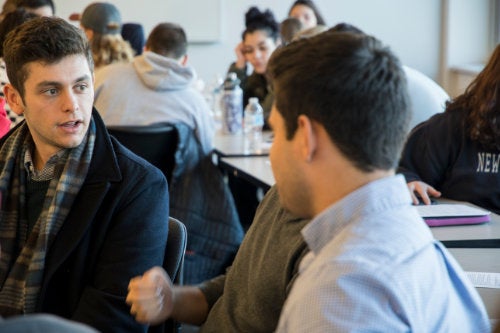Spanish IEP student, Michael Logar hikes in the Torres del Paine, Patagonia during a year abroad in Chile
When you connect meaningfully across cultures, you begin to see the world from a perspective that is different from your own. Taking on the world’s challenges requires the type of thinker who can look at a problem from multiple vantage points and find solutions others can’t see.
The International Engineering Program, or IEP, offers an unparalleled experience for students looking to become truly global engineers. You’ll earn two degrees simultaneously: a B.S. in an engineering discipline and a B.A. in Chinese, French, German, Italian, Spanish, or Global Language Area Studies with a concentration in Japanese. By combining the power of a world-class engineering program, immersion in a foreign language and culture and a year studying and interning abroad, the five-year program prepares engineers who can work collaboratively and efficiently on international teams.
The University of Rhode Island's groundbreaking International Engineering Program (IEP) serves as a model for engineering and language educators across the entire country.The Institute of International Education
News
 For URI engineering student, music and technology harmonize in innovative capstone project - North Providence native Ahmad Almuhtaseb ’26, discovered a way to merge his dual passions—music and his computer engineering major.
For URI engineering student, music and technology harmonize in innovative capstone project - North Providence native Ahmad Almuhtaseb ’26, discovered a way to merge his dual passions—music and his computer engineering major. URI celebrates 30 year partnership with German university - The University of Rhode Island has over 100 international partnerships and agreements. URI’s influence extends well beyond the Northeast—across the Atlantic and around the world. Among these numerous collaborations, one of the most enduring and consequential is URI’s partnership with Technische Universität Braunschweig.
URI celebrates 30 year partnership with German university - The University of Rhode Island has over 100 international partnerships and agreements. URI’s influence extends well beyond the Northeast—across the Atlantic and around the world. Among these numerous collaborations, one of the most enduring and consequential is URI’s partnership with Technische Universität Braunschweig.
 For two IEP and IBP students, their URI graduation will be a family affair - For Alex and Ethan Jedson and their family, the University of Rhode Island’s Commencement Weekend May 16-18 will be a busy one.
For two IEP and IBP students, their URI graduation will be a family affair - For Alex and Ethan Jedson and their family, the University of Rhode Island’s Commencement Weekend May 16-18 will be a busy one.- Ethan Jedson ’25, Spanish International Business Program - Ethan Jedson, ’25, has made the most of his experience through study abroad, campus involvement, and leadership roles. The economics, Spanish, finance, and accounting major within the International Business Program is now leaving URI with a full-time analyst position.



